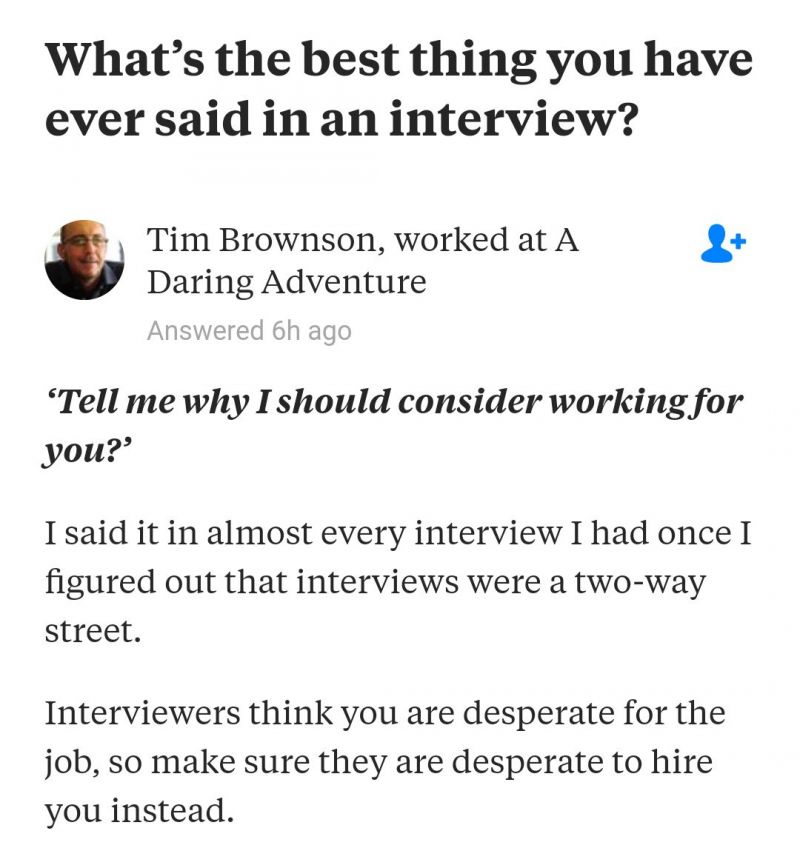Ranter
Join devRant
Do all the things like
++ or -- rants, post your own rants, comment on others' rants and build your customized dev avatar
Sign Up
Pipeless API

From the creators of devRant, Pipeless lets you power real-time personalized recommendations and activity feeds using a simple API
Learn More
Comments
-
I like to think a good interview gives you time to talk about what you have done and etc, and you can sort of transition into asking questions about what they do and maybe indicate you haven't done that yet.
-
From the sound of it, it feels like enterprise trying to buy skills.
An interview test at a good place to work should be conversational, and focused on solving logical problems. The worst places to work are those that ask you framework specific questions, because those places have no engineering rigor. -
@SortOfTested yeah they should hire based on problem solving not just obscure knowledge. Leetcode type questions aren’t a perfect measure but they’re a better one in terms of getting an idea of how smart the candidate is.
-
 KDSBest7305yMy best tip, be honest. If you get the job based on lies, it will most likely come to light anyway.
KDSBest7305yMy best tip, be honest. If you get the job based on lies, it will most likely come to light anyway.
But if you are honest and the company is worth it. They will give you a chance to learn and grow.
My 2 cents! -
@d-fanelli
If someone is a decent engineer, they can learn anything, and already know enough fundamentals to recognize classes of systems and soljtions.
The "JIT hiring" mindset leads to companies not investing in people and assuming they can hire talent that either paid to train themselves or someone else already trained them. Its just another way of pushing business liability onto employees and makes everyone a contractor. -
@SortOfTested Yeah. A decent engineer is a smart engineer who can learn new things and knows fundamentals. So jumping from one language or framework to the next shouldn’t take long if they’re similar to what he knows. Recruiters don’t get that sadly
-
Dude, just go ahead and do it for 2 reasons:
1) Even if you're bound to fail, it's still experience...
2) Last time I went job hunting, I had to pass a time-limited, no-second-chances online tech quiz. So, I started the quiz, but for some personal issues that came up at the moment I couldn't continue. Hell, I didn't even answered the first one. But guess what? They still offered me the position.
Now, I know what you're thinking, that company that wanted me despite the fact that I didn't do the test must be shit or desperate, and it could be, but if it happens to you and you're OK with the pay, the position and the project, you can always take the offer. You can definitely gain EXPERIENCE.
Good luck, man. -
Give it a shot, the worst that happens is you do badly and they don’t select you, but who knows, you might do good! They won’t select you if you skip the test.
-
You're all right, it's worth giving it a shot. I'll do whatever I know how to do, and be honest about what I'm lacking.
Thanks a lot for all the comments and suggestions.
I'll update about whatever happens if, well, anyone's interested. -
As expected, I haven't passed the test.
The good thing is that the reviewer has been kind enough to give me a few pointers and suggestions to improve.
Related Rants

 Stackoverflow.
Stackoverflow. For those of you who are having interviews ... remember this
For those of you who are having interviews ... remember this
Last week I had an initial interview for a mid-senior C# position, and I got asked to do a technical test to check on my actual skills.
The problem is that the skills required to meet all the criteria in said test are far beyond my actual knowledge, so I'm 100% sure I'm going to fail the test.
Now, the question is, should I be honest with the person that's going to review whatever I manage to do, and tell them upfront that I've never done this or that? Should I even try to do it on the test, even if it's the first time I try to do some of the points mentioned on the criteria?
It's the first time this happens to me, and I'm tempted to just tell them I don't feel capable of completing it, and leave it there.
question
interview
i feel like an absolute idiot